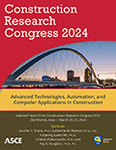Information Extraction for Semantic Enrichment of BIM for Bridges
Publication: Construction Research Congress 2024
ABSTRACT
Current bridge projects mainly rely on PDF plans as the official deliverables and documents to be stored, communicated, and transferred among different stakeholders. With the Industry Foundation Classes’ (IFC) Building Information Modeling (BIM) standard adopted by the American Association of State Highway and Transportation Officials (AASHTO) as the national standard for modeling bridge and road infrastructure projects, upgrading the documentation of bridge projects to 3D BIM in compliance with the national standard has become an urgent need. In this research, the state-of-the-art PDF2BIM algorithms were leveraged to semi-automatically create 3D geometric models of bridges based on PDF drawings. To enrich the 3D geometric model with semantic information of bridges’ components (e.g., bridge name, structure type, concrete strength), information extraction algorithms based on optical character recognition (OCR) and natural language processing (NLP) were developed to extract data from the bridge plans automatically. It significantly increases the efficiency and productivity of information extraction and enrichment of IFC-based BIM instance models for bridges by leveraging the rich information that already resides in the PDF plans. The results show that it achieved 97.6% accuracy in the information extraction task and reduced the overall time consumption on processing bridge data by 96.3% compared to the manual approach.
Get full access to this article
View all available purchase options and get full access to this chapter.
REFERENCES
Akanbi, T., and Zhang, J. (2022a). “Framework for developing IFC-based 3D documentation from 2D bridge drawings.” J. Comput. in Civ. Eng., 36(1), 04021031.
Akanbi, T., and Zhang, J. (2022b). “Semi-automated generation of 3D bridge models from 2D PDF bridge drawings.” Proc., ASCE Construction Research Congress, ASCE, Arlington, VA, 1347–1354.
BuildingSMART. (2023). “Industry Foundation Classes Version 4.2 bSI Draft Standard.” <https://standards.buildingsmart.org/IFC/DEV/IFC4_2/FINAL/HTML/>(Apr. 7, 2023).
Belsky, M., Sacks, R., and Brilakis, I. (2013). “A framework for semantic enrichment of IFC building models.” In Proceedings of the 30th CIB W78 International Conference, 2013, Beijing, China, 514–523.
Guo, X., Tian, C., Chen, Y., and Zhang, J. (2021). “Case study of building information modeling implementation in infrastructure projects.” Transportation Research Record, 2676(2), 663–679.
Ismail, A., Srewil, Y., Scherer, R., and Mansperger, T. (2016). “Semantic enrichment and multimodel data exchange approach for CFD analysis of bridges.” Proc., 23rd international Workshop of the European Group for intelligent Computing in Engineering, Krakow, Poland.
Isailović, D., Stojanovic, V., Trapp, M., Richter, R., Hajdin, R., and Döllner, J. (2020). “Bridge damage: Detection, IFC-based semantic enrichment and visualization.” Autom. Constr., 112, 103088.
IfcOpenShell. (2023). “IfcOpenShell.” Ifcopenshell.org, <http://ifcopenshell.org/> (Feb. 1, 2023).
Jiang, S., Feng, X., Zhang, B., and Shi, J. (2023). “Semantic enrichment for BIM: Enabling Technologies and Applications.” Advanced Engineering Informatics, 56, 101961.
Li, H., Zhang, J., Xue, X., Debs, L., Chang, S., Qu, M., Sparkling, A., and Goldwasser, D. (2022a). “Issues in bi-directional interoperability between BIM and BEM.” Proc., ASCE Construction Research Congress, ASCE, Arlington, VA, 1355–1364.
Li, H., Zhang, J., Chang, S., and Sparkling, A. (2022b). “BIM-based object mapping using invariant signatures of AEC objects.” Autom. Constr., 145(January 2023), 104616.
Li, H., and Zhang, J. (2022a). “Improving IFC-based interoperability between BIM and BEM using invariant signatures of HVAC objects.” J. Comput. in Civ. Eng., 37(2), 04022059.
Li, H., and Zhang, J. (2022b). “IFC-based information extraction and analysis of HVAC objects to support building energy modeling.” Proc. 39th Intl. Symposium on Automation and Robotics in Construction (ISARC 2022), I.A.A.R.C., iaarc.org., 159–166.
Mandava, B., and Zhang, J. (2016). “A new automated quantity takeoff method for BIM-based bridge designs.” Proc., CIB W78, Conseil International du Bâtiment (CIB), Rotterdam, The Netherlands.
Nanonets. (2023). “Intelligent document processing with AI.” Nanonets, <https://nanonets.com/> (Apr. 27, 2023).
Sacks, R., et al. (2018). “SeeBridge as next generation bridge inspection: Overview, information delivery manual and model view definition.” Autom. Constr., 90, 134–145, https://doi.org/10.1016/j.autcon.2018.02.033.
Wu, J., and Zhang, J. (2019a). “Introducing geometric signatures of architecture, engineering, and construction objects and a new BIM dataset.” In Proceeding of 2019 ASCE International Conference on Computing in Civil Engineering. Reston, VA, 264–271.
Wu, J., and Zhang, J. (2019b). “New automated BIM object classification method to support BIM interoperability.” J. Comput. in Civ. Eng., 33(5), 04019033.
Wu, J., and Zhang, J. (2018). “Automated BIM object classification to support BIM interoperability.” Proc., 2018 ASCE International Conference on Computing in Civil Engineering. Reston, VA, 706–715.
Wu, J., Akanbi, T., and Zhang, J. (2022). “Constructing invariant signatures for AEC objects to support BIM-based analysis automation through object classification.” J. Comput. in Civ. Eng., 36(4), 04022008.
Wu, J., Sadraddin, H. L., Ren, R., Zhang, J., and Shao, X. (2021). “Invariant signatures of architecture, engineering, and construction objects to support BIM interoperability between architectural design and structural analysis.” J. Constr. Eng. Manage., 147(1), 04020148.
Wu, J., Xue, X., and Zhang, J. (2023). “Invariant signature, logic reasoning, and semantic natural language processing (NLP)-based automated building code compliance checking (I-SNACC) framework.” ITcon, 28, 1–18.
Wu, J., and Zhang, J. (2022). “Model validation using invariant signatures and logic-based inference for automated building code compliance checking.” J. Comput. in Civ. Eng., 36(3), 04022002.
Xue, X., Wu, J., and Zhang, J. (2022). “Semi-automated generation of logic rules for tabular information in building codes to support automated code compliance checking.” J. Comput. in Civ. Eng., 36(1), 04021033.
Information & Authors
Information
Published In
History
Published online: Mar 18, 2024
ASCE Technical Topics:
- Architectural engineering
- Bridge components
- Bridge engineering
- Bridge foundations
- Bridges
- Bridges (by type)
- Building information modeling
- Building management
- Caissons
- Construction engineering
- Construction management
- Engineering fundamentals
- Foundations
- Geotechnical engineering
- Highway bridges
- Models (by type)
- Project management
- Structural engineering
- Three-dimensional models
Authors
Metrics & Citations
Metrics
Citations
Download citation
If you have the appropriate software installed, you can download article citation data to the citation manager of your choice. Simply select your manager software from the list below and click Download.
